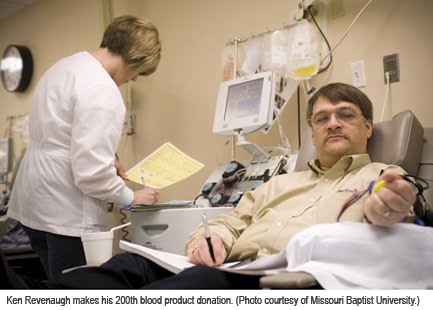By Bryce Chapman
Missouri Baptist University
On a whim, Ken Revenaugh, Missouri Baptist University vice president for business affairs, turned his car into a church parking lot after spotting a sign soliciting donors for a blood drive. 
That was in 1980. Revenaugh, who was living in Omaha, Neb., decided to spend part of a rare afternoon off donating blood. That afternoon marked the first in what has become a more-than-two-decade quest to save lives.
On March 27, Revenaugh celebrated his 200th blood product donation at St. John’s Mercy Medical Center in Creve Coeur.
“I had no idea back then that I would be good for 200 more,” joked Revenaugh as he met his milestone from a medical chair in St. John’s Blood Donor Services Department. “This has proven to be one way I can provide for people who are in need.”
In the early 1990s, Revenaugh decided to take his blood donation to another level. He opted to give platelets after learning about the potentially life-saving role that part of the blood, which is essential for clotting, can play in certain cancer patients.
He hasn’t stopped.
“The fact that it is such a time commitment, we see only a handful of donors who reach Ken’s level of commitment,” said registered nurse Barb Klinkartdt.
It usually takes two hours to donate one to two units of platelets. That time commitment, along with the fact that platelets must be transfused within five days compared to a 42-day period for whole blood, means committed donors like Revenaugh are as rare as they are important.
It’s estimated that someone needs blood every three seconds. However, less than five percent of the population donates blood. Significantly fewer people make time to donate platelets, Klinkartdt said.
Despite the rarity of committed donors, transfusable platelets serve crucial life-saving purposes.
Klinkartdt, along with most of the Blood Donor Services staff, has over the years grown to know Revenaugh well. When St. John’s platelet stock reaches a critical low, Revenaugh is one of the first on their list to call.
“We really could not be the institution we are without the dedication of people like Ken,” Klinkartdt added.

